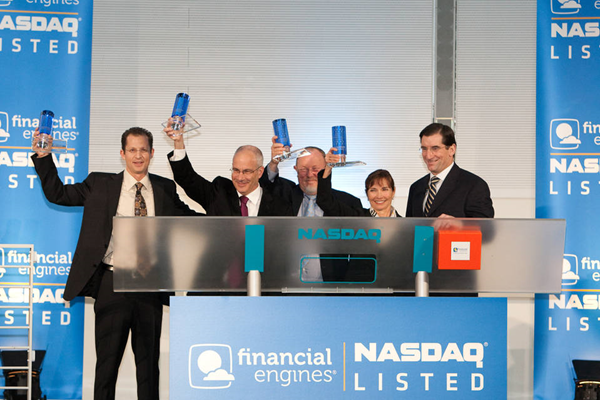|
THE
WALL STREET JOURNAL.
Markets
|
Your Money
|
Wealth
Adviser
Financial Engines to Offer 401(k) Savers Free Access to Advisers
Push comes as financial companies seek ways to combine
computerized and human assistance
|

Financial Engines executives rang the Nasdaq opening bell in
March 2010 to celebrate the company's IPO. Five years later, the
company is making a bid to entice investors to its managed
accounts. PHOTO: NASDAQ OMX GROUP |
By
Anne Tergesen
Sept. 23, 2015 7:00 a.m. ET
A giant in the business
of guiding 401(k) plan savers is making a push to offer millions of
those investors access to its human advisers as well as online tools.
Financial Engines
Inc.
hopes the move will appeal to employers looking to help workers
achieve “financial fitness,” while also enticing more individual
savers to hire the Sunnyvale, Calif., firm to manage their 401(k)
money for a fee.
The development comes at
a time when many financial companies are looking for ways to combine
computerized and human assistance, as automated “robo advisers”
challenge traditional one-on-one advice relationships. Vanguard Group
recently launched a service that includes both Internet-based advice
and contact with a salaried Vanguard adviser.
Roughly nine million
people currently have access to Financial Engines’ services through an
online tool, which is paid for by fees charged to plan sponsors.
Starting next year,
about half of those people will be invited to speak to advisers via
telephone, webcam or live chat for free, the company said Wednesday.
Advisers can help
callers validate their investment strategies, figure out how to
balance a budget, decide when to claim Social Security, and understand
the impact on a nest egg of raising or lowering their savings rate,
Financial Engines spokesman Mike Jurs said.
Kelly O’Donnell, an
executive vice president at Financial Engines, said the new service is
designed, in part, to appeal to plan sponsors seeking to add so-called
financial-wellness assistance. Modeled after the physical-wellness
programs that aim to help employees lose weight or improve their
physical fitness, financial-wellness offerings can feature a range of
programs, including counseling sessions designed to help workers
better manage their finances, such as by balancing a budget or paying
down debt. A number of employers—such as
Meredith Corp.,
Staples Inc.
and
PepsiCo Inc.
--are
introducing such services.
“Our clients assess us
on how much impact we are having,” said Ms. O’Donnell. She said the
questions they ask include, “Are participants saving more? Are their
portfolios better diversified? Will they have enough for retirement?”
To improve such
outcomes, “we want to be able to help all 401(k) participants look at
their full financial pictures,” Ms. O’Donnell said.
Along the way, she said,
Financial Engines hopes that more 401(k) participants will decide to
enroll in—and pay for—its managed-account service, which includes
deciding how much to invest in stocks and bonds, choosing from among
the plan’s investment options, and periodically rebalancing an
investor’s account to its target asset mix.
Financial Engines is
already the leader in the fast-growing market for 401(k) managed
accounts. According to Cerulli Associates, a research firm that
specializes in the asset-management industry, Financial Engines had
$114.5 billion in assets under management at midyear, or 60% of the
$186.7 billion market. Rivals
Morningstar Inc.,
Fidelity Investments and GuidedChoice Inc. had respective market
shares of 20%, 7% and 7%.
Having a managed account
gives investors professional help with their retirement investments,
often at a lower cost than they would pay for a traditional financial
adviser. Customers generally work with a call-center team rather than
a particular adviser, and managed-account staff don’t typically
provide help with broader financial issues like insurance or estate
planning. Financial Engines says clients can request a specific
adviser.
According to Cerulli,
the $186.7 billion in managed accounts is up from $124 billion in
2013. Benefits consultant Aon Hewitt said about 52% of large
401(k)-plan sponsors offered managed accounts in 2013, up from 29% in
2011. Many industry watchers expect demand for the services to grow as
the baby boomers get closer to retirement—frequently a time when
employees seek out the more customized advice available through a
managed account.
Managed accounts compete
with target-date funds, all-in-one mutual funds that automatically
reset an investor’s asset allocation by reducing stock holdings and
increasing the portion in bonds as the investor ages. But while many
more 401(k) participants use target-date funds than managed accounts,
some criticize the funds for taking a one-size-fits-all approach to
the asset allocations of investors who are the same age.
Financial Engines’ fees
range from 0.2% to 0.6% of assets a year for the managed account
service, in addition to the fees of the mutual funds 401(k)
participants invest in. The exact fee depends on the size of an
individual’s account as well as the size of the plan they belong to.
Currently, the
managed-account program is available to nine million employees in 650
plans, and about 10% of the participants are paying for the service.
Financial Engines and
other advisers are also offering services to help retirees draw down a
steady income after they have left their jobs. Some, including
Financial Engines and GuidedChoice, provide income-planning and
investment-management services that were previously available only in
401(k) plans. The companies may also help workers figure out the
optimal time to claim Social Security benefits.
Write to
Anne Tergesen at
anne.tergesen@wsj.com
|